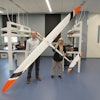British company Dyson is most famously known for its high-end vacuum cleaners touted on the air by founder, chief engineer and namesake James Dyson.
But the company also makes a wide variety of other electronics, and in 2017 officially signaled its ambitions to dive into the nascent market for electric vehicles.
By that time, Dyson had formed a team of hundreds of engineers, acquired a Michigan battery technology company and committed more than $2 billion to the effort. It subsequently outlined plans for testing facilities in England and a factory in Singapore.
But just about two years after officially announcing the vehicle initiative, Dyson is reportedly pulling the plug.
CNN reports that James Dyson, in a note to employees, wrote that the company's engineers had developed a “fantastic” electric vehicle, but that the project would not be commercially viable and that no buyers interested in acquiring the project had surfaced.
Dyson said the company’s battery efforts would continue, and that the hundreds of workers on the project would be either transitioned elsewhere in the company or “supported fairly” as the vehicle initiative winds down.
But the decision adds to a familiar refrain for those companies venturing into the auto industry, with its massive capital and R&D requirements, for the first time: how to actually turn a profit.






















